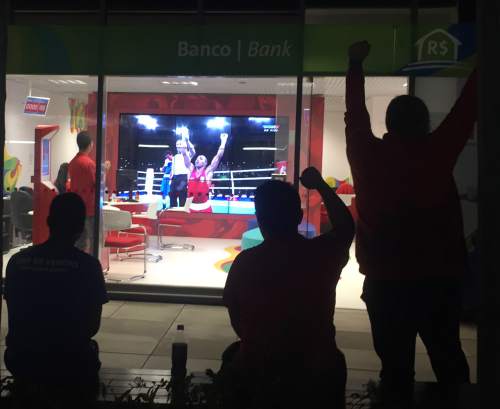This is an archived article that was published on sltrib.com in 2016, and information in the article may be outdated. It is provided only for personal research purposes and may not be reprinted.
Conceicao, 27, had just won Brazil's first-ever gold medal in boxing and the host country's third gold to date. Brazil entered the medal count Wednesday down in the standings in 14th place — three gold, four silver, four bronze. Outside the Main Press Center, the volunteers clapped for a while. One man wrapped his hands around the shoulders of his friend, once again yelling, "Para o Brazil!"
Translation: "For Brazil!"
They watched history through the glass panels of a small bank located outside the Main Press Center. The elation turned heads of exhausted reporters, producers and other media types stumbling to their next destination. Didn't matter much to the Brazilians reveling in moments that have proven too few for the hosts so far.
The complicated relationship between the Olympics, Rio de Janeiro and Brazil over the years became transformed from initial anticipation to dread by so many. In 2009, when the country received the official bid to host South America's first Olympic Games, Brazil's economy was thriving, in the midst of an economic boom. The Games envisioned then are not what's on display in Rio. Protests surrounding a floundering financial system in the weeks and months ahead of these Olympics became front-page news worldwide.
Who could forget Rio's police officers welcoming the world at the city's international airport with a sign that read "Welcome to Hell"? Two weeks in, American gold medalist Ryan Lochte reportedly was robbed at gunpoint. The water in the diving pool turned green, smelled like flatulence and caused eye irritation for athletes aiming for medals. An aerial cam inside Olympic Park fell from the sky, injuring seven people.
These Olympics always will be a source of strife. When the estimated 350,000 to 500,000 visitors board their flights back home, Rio's residents and Brazilians around the country still face an uncertain future, and that's probably the unfortunate piece of this puzzle. The economic crisis remains in an unfortunate full swing, the political nightmares continue, and with five days left in these Games, it's hard not to think about what will happen when those riding on cushy media shuttles equipped with Wi-Fi are homeward bound.
Watching Concecaio's gold-medal bout provided a glimpse into what success means to the hosts. I had my first glimpse last Friday, when in a fairly quiet moment inside the Main Press Center, a Brazilian media member pushed both his feet off the floor and rolled in his chair across the carpet seeing Rafael Silva's bronze medal in judo. Like the group who watched Concecaio's gold, this guy celebrated by holding back tears and phoning as many people as he could to discuss the victory.
Brazil wasn't officially captivated by these Olympics until a 22-year-old pole vaulter celebrated on his way back down to earth. Thiago Braz da Silva's 6.03-meter vault Monday brought gold, and with it, a new Olympic record. Once da Silva cleared the bar, the youngster flexed, knowing a much-needed moment was delivered by him contorting his body nearly 20 feet off the ground.
Presented with the gold medal Tuesday night at Olympic Stadium, da Silva pumped up the crowd before stepping onto the center of the podium. There have been too few moments worthy of Olympic joy for Brazilians here in Rio, but da Silva delivered.
Inside The Maracanã on Wednesday afternoon, it took Neymar all of 14 seconds to ensure Brazil would have its shot at gold in the Olympic final. The blunder by the Honduras back line was so quick that I nearly missed it. That goal and the ones that soon followed gave the sea of yellow inside one of the world's most famous stadiums something else to look forward to before the Olympics sign off from Rio de Janeiro.
— Chris Kamrani
Twitter: @chriskamrani



